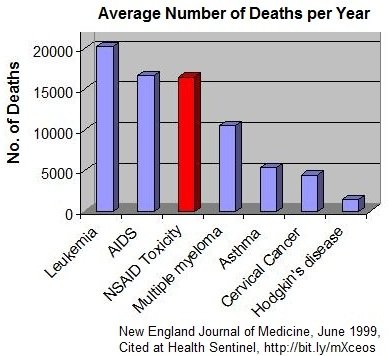Recent Considerations in Nonsteroidal Anti-inflammatory Drug Gastropathy
SOURCE: American Journal of Medicine 1998 (Jul 27); 105 (1B): 31S–38S
Gurkirpal Singh, MD
Department of Medicine, ARAMIS Postmarketing Surveillance Program,
Stanford University of Medicine, Palo Alto, California 94303, USA
Conservative calculations estimate that approximately 107,000 patients are hospitalized annually for nonsteroidal anti-inflammatory drug (NSAID)-related gastrointestinal (GI) complications (internal bleeding) and at least 16,500 NSAID-related deaths occur each year among arthritis patients alone.The figures for all NSAID users would be overwhelming, yet the scope of this problem is generally under-appreciated (and under-reported!).
In the following year the prestigious New England Journal of Medicine published a similar statement:
“It has been estimated conservatively that 16,500 NSAID-related deaths occur among patients with rheumatoid arthritis or osteoarthritis every year in the United States. This figure is similar to the number of deaths from the acquired immunodeficiency syndrome and is considerably greater than the number of deaths from multiple myeloma, asthma, cervical cancer, or Hodgkin’s disease. If deaths from gastrointestinal toxic effects from NSAIDs were tabulated separately in the National Vital Statistics reports, these effects would constitute the 15th most common cause of death in the United States. Yet these toxic effects remain mainly a “silent epidemic,” with many physicians and most patients unaware of the magnitude of the problem.
Furthermore, these mortality statistics do not include deaths ascribed to the use of over-the-counter NSAIDS.”
Another statement that just happened to catch my eye:
On the basis of these conservative figures and ARAMIS data, the annual number of hospitalizations in the United States for serious gastrointestinal complications is estimated to be at least 103,000. At an estimated cost of $15,000 to $20,000 per hospitalization, the annual direct costs of such complications exceed $2 billion. [14]
Thanks to the American Nutrition Association
for access to this picture!
The Arthritis, Rheumatism, and Aging Medical Information System (ARAMIS) Post-Marketing Surveillance Program (PMS) has prospectively followed patient status and outcomes, drug side effects, and the economic impact of illness for >11,000 arthritis patients at 8 participating institutions in the United States and Canada.
Analysis of these data indicates that:
There are more articles like this @ our:
- osteoarthritis (OA) and rheumatoid arthritis (RA) patients are 2.5—5.5 times more likely than the general population to be hospitalized for NSAID-related GI events;
- the absolute risk for serious NSAID-related GI toxicity remains constant and the cumulative risk increases over time;
- there are no reliable warning signals- >80% of patients with serious GI complications had no prior GI symptoms;
- antacids and H2 antagonists do not prevent NSAID-induced gastric ulcers,
and high-risk NSAID users who take gastro-protective drugs are more likely to have serious GI complications than patients not taking such medications. - independent risk factors for serious GI events were age, prednisone use, NSAID dose, disability level, and previous NSAID-induced GI symptoms
The author concludes:
Currently, limiting NSAID use is the only way to decrease the risk of NSAID-related GI events (deaths).
No one has yet calculated the total cost for hospitalizing the 107,000 patients, or the pain and suffering experienced by the families of those 16,500 individuals who die, simply for using NSAIDs for pain relief.
Research has clearly demonstrated that Omege-3 Fatty acids provides the same level of pain relief as NSAIDs, and investigators have reported that rheumatoid arthritis patients, consuming omega-3 dietary supplements, were able to either lower or discontinue their background doses of nonsteroidal antiinflammatory drugs.
Considering that patients with arthritis are one of the leading group-users of NSAIDs, perhaps it’s time for medical guidelines to recommend Omega-3 fatty acids FIRST for pain relief, before resorting to the more dangerous NSAIDs.



Leave A Comment